Gadgets to help in the parlour
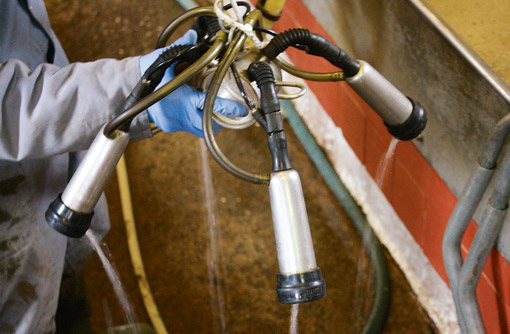
Airwash/back-wash system
Why?
One of the most critical factors in the spread of contagious mastitis throughout a herd is the cross infection that can occur when milking clusters are passed directly from one cow to the next.
Trials have revealed that a liner used to milk one infected cow can infect the next six cows it is used on.
It follows that the liners should be sterilised before they are used to milk the next cow.
What?
The AirWash or back-wash system, which was developed 20 years ago in Holland and is now marketed in the UK by Cheshire’s Dairy Spares, is designed to work on individual liners with fluid/air entering the small milk tube via a “T” junction having a non-return valve. The fluid used to flush the liners can be mains water or, if from a borehole supply, a solution of peracetic acid.
The system has an operating sequence that sees the liners receiving a succession of programmable air blasts and water rinses, which takes between 20 and 30 seconds to complete. Liquid consumption is about 400ml.
Cost
£500/point (guide)
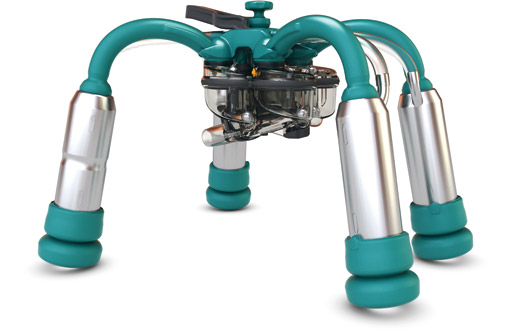
Four-way milking cluster
GEA Technologies claims to have developed the world’s first four-way milking cluster that keeps the milk delivered from each quarter separate until it enters the milk line.
The design of the IQ cluster, says the company, prevents milk from one quarter being able to reach the tip of the teat in another quarter and ensures there is no cross contamination – although it should be said there are those who hold the view that there can be cross contamination within the udder itself.
Other features of the IQ include a system that only activates the full vacuum once the milking cup has been attached to the teat and, when milking, the vacuum in the cluster is said to remain stable even under high milk flows.
Use of longer milk tubes with internal pulsation tubes results in a slim build, which is more difficult for the cow to kick off.
Cost
Price is available on application.
Thermostrips and temperature gauges
Why?
Ensuring washing solutions are at the correct temperatures when they pass though milk lines is important and the thermostrip sets out to provide an economical way of monitoring these temperatures.
The two critical temperatures to note are 82C, which is the highest temperature the solution should be as it enters the pipe lines, and 34C, which is the lowest temperature it should arrive back at. Above 82C and the fat will “fry” and stick to the pipe walls, and below 34C there will be re-depositing of solids along with bacteria.
What?
Thermostrips use a colour code to indicate the temperature band and, while being relatively cheap and easy to use, they are just stuck on the surface of the pipes at the appropriate location. The importance of maintaining the correct temperatures has led some dairy farmers to fit analogue temperature gauges, which have probes that penetrate into the wash solution and provide a more precise temperature read out.
Cost
RS Components have the Jumo range of thermometers and probes. Prices start at about £87.
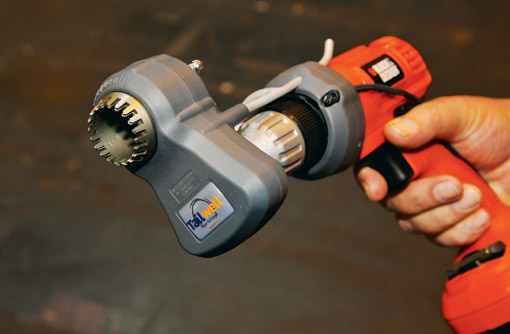
Battery-powered tail clippers
Why?
Tails may be handy fly swatters for cows, but for the unwary herdsman they can be a source of an unexpected swipe and the transfer of unpleasant, smelly, abrasive material.
What?
Marketed by Northern Ireland’s Agrihealth, the New-Zealand made Tailwell2Power tail trimmer attaches to the chuck of a standard 14V cordless drill that powers its rotary cutter. A torque bar links back to the drill to hold the cutter still.
In action, the cutter slides on to the tail stump and removes all long hair as it is slid up the tail. The hostile working conditions prompts the manufacturer to point out that regular lubrication is essential – every 30 to 50 tails or more frequently if the tails have sand in them.
For safety, the inner cutter does not move and the cutting action comes from the 18-degree oscillation of the outer cutter. After about 300 cows, the cutters need to be sharpened and, for this, they need to be sent away – the metal used is too hard for any form of hand sharpening, says the manufacturer.
Cost
£265.
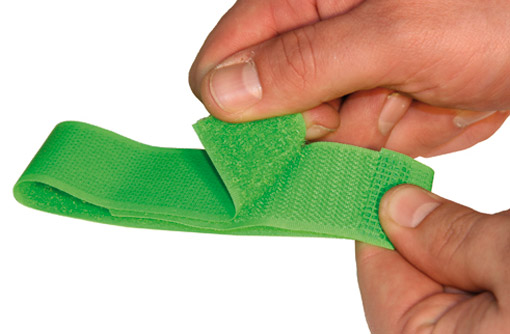
Velcro straps and tape
Why?
A simple and economical system of marking cows so that they can be singled out for treatment or to remind the herdsman that she has had antibiotics and the milk needs to be separated, is now normally essential in the absence of any electronic ID recording system.
What?
Dairy Spares offers a large range of Velcro straps in different colours, which can be attached to a cow’s ankle and the company also has coloured tape for marking tails as an alternative system.
Cost
Minimal.
Automated heat detection
Why?
As dairy herds become larger, the task of identifying a cow when she is on heat becomes increasingly difficult. Any aid then that can help with this task has to be an attractive option.
What?
It is a detail not lost on manufacturers, who have produced a number of different designs and systems, but typical is the Nedap Lactivator, which is claimed to offer accurate heat detection.
Using a leg or neck sensor, the cow’s activity is recorded and compared with her activity during the same period in preceding days. If it has increased or dropped significantly over several consecutive periods, the system sends a suspect attention warning that, should the activity changes increase, is followed by an attention warning.
Information can be received by different parlour-based herd management systems either through use of floor or walk through antennas or, with the Realtime system, an antenna with a detection range of at least 50m.
Waterproof mobile phone cover
Why?
Milking parlours can be pretty hostile places when it comes to mobile phone use – wet hands, wet floors and, on occasions, generous amounts of slurry.
It makes good sense then to provide some waterproof protection for mobile phones and a good port of call could be to take a look at the boat sailing industry, where it could be argued, the threat of water damage is even more threatening.
What?
Isle of Wight firm Aquatogs markets the OverBoard waterproof phone case, which is said to be 100% waterproof, submersible up to 6m, floatable and the owner can use all touchscreen functions.
Cost
£15.95.
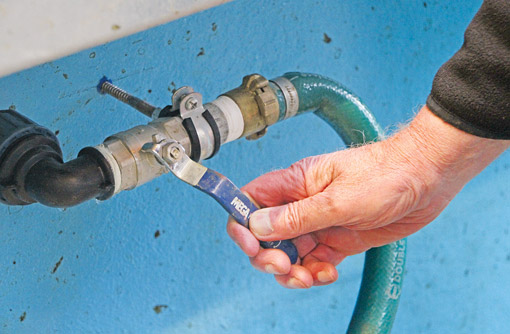
Pipe connectors
Why?
Dragging enormous lengths of hosepipe around a parlour every time a cow makes a mess that needs washing away is time consuming and cumbersome – as is having the pipe laying around the parlour for someone to trip over.
What?
The solution is to have a pipe circuit with snap-on pipe connectors placed at regular intervals to which shorter lengths of pipe can be connected.
Cost
Lever ball valves cost about £10 and snap-on connectors a similar amount.
Handhold liner sprayers
Why?
For those who do not want the expense of installing an AirWash cluster sterilising system there is the handheld liner sprayer that applies a peracetic acid solution at a concentration of between 0.05 – 0.1%.
This sterilises the liners and breaks down to carbon dioxide, water and oxygen – so no rinsing is required and there are no problems of milk taint or contamination.
What?
Typical, perhaps, of the systems on the market is the PeraSpray, which is a vacuum-operated power unit based on the Ambic Jetstream teat sprayer system with seals and components resistant to peracetic acid.
The system comes with three applicators and there are extension kits available for larger parlours.
